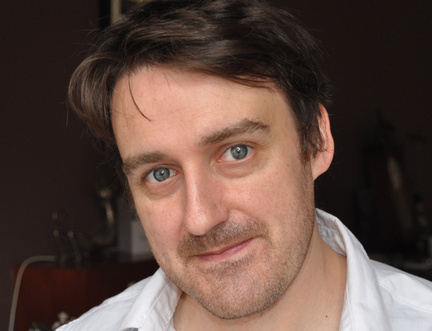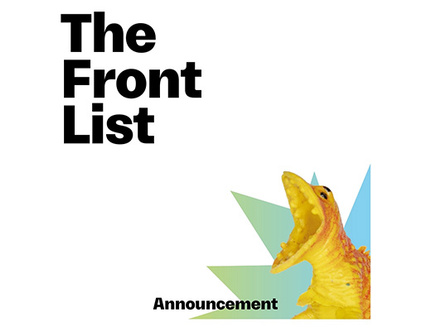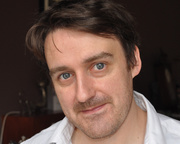Strap
By Peter Mackay

In 2018, we commissioned 51 authors from 25 countries to write essays exploring ideas about freedom for The Freedom Papers, a publication produced in partnership with Gutter Magazine. Read on for Peter Mackay's essay (in both Gaelic and English), and visit guttermag.co.uk to purchase a copy of The Freedom Papers.
Tha saorsa agam an cànan seo a chleachdadh.
A bheil sin ceart? A bheil sin a’ faireachdainn ceart? Saorsa. Cha tèid mo chur am prìosan, neo m’ fhògairt gu tìr eile, neo mo strapadh airson a bhith ga bhruidhinn. Chan eil Lochgelly a’ crochadh os cionn mo làmhan, no Bàgh Bhotany an dàn dhomh. Tha fiù’s a bhith a’ sgrìobhadh seo còltach ri aibheiseachadh (ged nach robh e an-còmhnaidh mar sin). Tha mi air a bhith fortanach. Fad mo bheatha bha cothrom agam a bhith ag ionnsachadh na Gàidhlig aig an sgoil, agus bha cothrom agam a bhith ag obair sa chànan, a’ teagasg agus a’ craoladh.
Ach.
Chan eil cead agam a chleachdadh airson a h-uile sìon.’S dòcha gur e cothrom bhòtaidh a tha a’ bualadh orm as cruaidhe: rud a th’ ann a tha ro chudromach, tha e còltach, airson na Gàidhlig. Agus bidh mi gam chuingealachadh fhìn - tha cnap mòr dem bheatha far nach robh,’s nach eil, Gàidhlig mar phàirt dheth. Ach carson a bhiodh?’S e aon de na rudan mu bhith ioma-chànanach gum bi taobhan, pearsantachdan, saoghalan diofaraichte agad: sùbailteachd. Agus cuideachd tha crìochan, cuingean agus mùchadh an lùib na Gàidhlig fhèin, o dhùthchas agus o dhùil: airson adhbhar air chor-eigin bidh teagamhan fhathast a’ nochdadh mu dheidhinn cùisean nach eil ‘iomchaidh’ airson litreachas neo cùltar sa chànan.
Ach, ach.
Chan eil sin faisg fiù’s air toiseach na sgeòil. Saorsa agus dleastanas. Cothrom agus cead. An e ceist faoin a th’ ann a bhith a’ faighneachd carson a dh’fheumadh ‘cead’ a bhith ann cànan sam bith a chleachdadh: ceist nach eil a’ tuigsinn gu bheil a h-uile sìon – cànan, cead, saorsa – ceangailte ri mar a tha cumhachd ga giùlain fhèin? Air an dàrna làimh, ‘This island’s mine, by Sycorax my mother’ mar a chanadh Caliban: carson a dh’fheumainn cead iarraidh a bhith beò ann? Agus air an làimh eile, tha an cànan a chur dleastanas oirbh, leis gu bheil saorsa ann a bhith ga chleachdadh: ‘the isle is full of noises’, fuaimean nach urrainn dhut seachnadh… Caliban, a’ bruidhinn ann am Beurla Phrospero, Beurla Shakespeare. Caliban, ‘slave, whom stripes may move, not kindness’: tha e airidh air an strap, chanadh Prospero.
Tha Caliban a’ nochdadh mar shamhla de cholonachd, de mar a bhiodh seilbheadaireachd (thìre,chànain, rùin) air thoirt air falbh bhuat, a’ fàgail sgàradh agus rù-rà. Ach chan e samhla a th’ann gun dòchas.’S e aghaidh-choimheach (lesmèid ri Iain Moireach) a th’ ann an Caliban, air neo iuchar a tha a’ sealltainn dhut gu bheil gach caractar, dreuchd, miann, fiù’s gach cànan mar aghaidh-choimheach: àite far a bhios tu a’ falach, neo gad chruthachadh fhèin. Tha nàdar de shaorsa na lùib sin, o bhith a’ cur ort ìomhaigh eadar-dhealaichte. Agus gun teagamh tha saorsa na h-aghaidhe-choimhich sin a’ tàladh iomadh dhuine dhan a’ Ghàidhlig, neo gan cumail a bhruidhinn, a’ togail saoghaltan ùra leis, neo ag ath-chruthachadh saoghal a bha ann mu thràth, a dh’aindeoin a’ choltais bhith-bhuan a bha air.
Plòigh.’S e fèis-teine a th’anns a’ Chorrefoc ann am Barcelona. Bidh daoine ann an èideadh diabhail a’ ruith tro chaol-shràidean a’ Bharri Gòtic, cleasan-teine aca aig dèireadh slatan meatail, mar ‘chuibhlichean Chàitriona’ air slatan-fèineag. Fàileadh cordite a’ lionadh an àile, mac-talla nam bragan air clachan na h-àrd-eaglaise agus nan clabhsairean, sradagan a’ taomadh air d’fhalt agus tu a’ ruith tro phrasg nan diabhlan. Tha na togalaichean air a bhith ann còrr is 700 bliadhna, agus tha còltas air an fhèis ionadail seo gu bheil e cho sean sin cuideachd.’S math dh’fhaoidte gu bheil, ach thoisich i às ùr (mar na correfocs eile air feadh Catalunya) aig toiseach nan 80an, anns na bliadhnaichean dòchasach sin as dèidh bàs Fhranco agus claonadh Fhaisisteachais. Còmhla ri cead (saorsa?) a bhith a’ bruidhinn Catalan, a bhith a’ dannsadh sardanes, bha na fèisean seo: teine a’ ruith tro na sràidean, sradag a’ sireadh càrnabhail, neo aramach.
B’ iad na diabhlan a b’ inntinniche dhomhsa dhen Correfoc nuair a bha sinn ann, Lùnastal an-uiridh, beagan seachdainean ron reifreann air neo-eisimeileachd Chatalunya. Bha a’ mhòr-chuid dhuibh tana, le craiceann mar leathar ghrìosaich. Bha iad air a bhith thall ’s a chunnaic, agus iad air a bhith a’ dèanamh seo airson deicheadan. Eideadh seach aghaidhean-choimheach a bh ’orra, ach bha an aon èifeachd ann. ’S e cluich-riochd neo cleas a bha iad ris, ach cleas le cumhachd, le ciall: dleastanas choimhearsnachd air a chluich gu diabhalta, gu gàirdeachail, ann an ainm nàdar de shaorsa.
Cho furasta am facal sin a’ leigeal sìos ann an seantans sam bith. Ach cha bhith ‘saorsa’ agus tearainteachd a’ suidhe gu frogail ri taobh a chèile. Neo ‘saorsa’ agus seasmhachd. An latha as dèidh a’ Chorrefoc, mharbh Younes Abouyaaqoub 13 neach air La Rambla; chaochail 16 uile gu lèir ann an trì ionnsaighean ann am Barcelona, Alcanar agus Cambrils; chaidh còrr is 150 a leòn. Bailtean nach robh an dùil gun robh iad idir ann an cunnart, bailtean a bha air na cogaidhean ann an Iorac agus Siria a dhiùltadh. Agus on reifreann ann an Catalunya, na mìltean air na sràidean, a’ togail fianais an aghaidh riaghaltas na Spàinne, agus poileas na Spàinne, an aghaidh an fhòirneirt a chaidh a chleachdadh an aghaidh luchd-bhòtaidh, an aghaidh oidhirpean luchd-poiliteags a chur am prìosan airson easaontais (co-obraiche agam aig Oilthigh Chill Ribhinn, Clara Ponsatí, nam measg).
Tha iomadh strì ann, cuid nach urrainn dhut a thaghadh neo a sheachnadh, cuid is urrainn. Dè seòrsa saorsa, neo ceadan, neo cothroman, neo saoghal ris a bheil sinne strì? Cò sinne? Ca’ bheil na loidhnichean nuair a tha thu a’ bruidhinn mu dheidhinn cumhachd, agus a bhith putadh an aghaidh na cumhachd? Cò às a tha saorsa a’ tighinn? Chan eil fhios’am.Ach tha mi ag aithneachadh cho luath’s a dh’fhaodas ‘saorsa’ atharrachadh agus a chlaonadh fo bhuaidh chumhachdan sgapach neo fo bhuaidh dìorrais. Ag aithneachadh nach eil saorsa beò air leth, ach mar phàirt de choimhearsnachd: le sin bidh faiceallach dè an coimhearsnachd a thaghas tu. Nach urrainn dhut aghaidh-choimheach a sheachnadh: le sin bidh faiceallach dè a’ mhasg a thaghas tu. Agus a dh’aindeoin nan dleastanasan’s nan cuingean, tha mi deimhinne às gur e nàdar de shaorsa (achc uideachd spàirn’ saghaidheachd) a th’ ann a bhith cur air aghaidh-choimheach na Ghàidhli:, masg ann an strapaichean, ach grìosaichte’smaireannach.
***
Translated by Peter Mackay
I’m free to speak this language.
Is that right? Does that feel right? Free. I won’t get the strap, or the prison, or be transported for speaking it. There’s no threat of the Lochgelly or Botany Bay hanging over me (though that wasn’t always the case). Even writing this feels an exaggeration. I’ve been lucky; I’ve had the chance to learn Gaelic, or through Gaelic, all my school years; and I’ve been able to work in the language, teaching and broadcasting.
But.
I can’t use it for everything. Maybe the inability to vote is the thing that hits hardest: voting, it appears, is too important to be done through Gaelic. But I also limit myself: there are parts of my life I have never lived through Gaelic. Not that this is a problem, though – being multilingual means having all those different facets, personalities, worlds, being flexible. And then there are limits, borders, and moments of suffocation within the language itself too, from traditions or expectations: for some reason, the hoary old questions still appear of what is ‘appropriate’ for the Gaelic language or culture.
But, but.
That doesn’t seem anywhere near the start of things. Freedom and responsibility. Opportunity and permission. Is it daft to ask why there would need to be ‘permission’ to use any language: is this a question that ignores how everything – language, permission, freedom – is tied up in the manifold ways power exerts itself? On the second hand (there’s the unsettling Gaelic phrase for you): ‘This island’s mine, by Sycorax my mother’, as Caliban would say, why would I need to ask permission to live there? And on the other, the language exerts its own responsibilities on you, if you will take the liberty of using it: ‘the isle is full of noises’, noises you can’t avoid… Caliban, speaking Shakespeare’s English but still a ‘slave, whom stripes may move, not kindness’. Caliban, who for Prospero bloody well deserved the strap.
Caliban, inevitably, appears as a symbol of colonialism, of how possession (of land, language, desire) can be stripped from you, leaving schism and disorder. Not, though, a hopeless symbol. Caliban is (with a nod to Iain Moireach) a mask, or a key to understanding that every character, role or desire is a mask, every language even: somewhere you hide or create yourself. There is a kind of freedom there, in putting on a different role or habit. And there’s no doubt that the freedom of this type of mask attracts people to Gaelic, or keeps them talking it, to create new worlds, or rebuild old ones, no matter how square-set and intransigent they might seem.
The Correfoc in Barcelona is a fire festival. People dressed as devils run through the alleyways of the Barri Gòtic, firework rigs strapped to the end of metal poles, like Catherine Wheels on the end of selfie-sticks. The smell of cordite fills the air, bangs echo off the walls of the cathedral and the cloisters, sparks shower onto your hair and clothes as you run through the roving demons. The buildings have been there for over 700 years, and the festival, a relatively small community affair, feels like it could be that old too. It might be, but it started in its current form (like the other correfocs, around Catalunya) in the early 80s, in the hopeful years that followed the death of Franco and the decline of Fascism. Along with permission (freedom?) to speak Catalan, and to dance sardanes, there were these festivals: fire running through the streets, a spark in search of a carnival, or an overthrowing.
It was the devils I found most interesting in the Correfoc when we were there last August, a few weeks before the Catalan independence referendum. Most of them were wirey, with skin like baked leather. They’d been about, and had been playing the devil for decades. They had outfits rather than masks, but the effect was the same: they were playing a role, but one with power and meaning – a communal responsibility carried out impishly, joyously, in the name of some kind of freedom.
It’s easy to let that word fall into any sentence. But freedom and security don’t sit happily together. Or freedom and stability. The day after the Correfoc, Younes Abouyaaqoub killed 13 people on La Rambla; 16 died altogether (apart from those responsible) in three attacks in Alcanar, Barcelona and Cambrils; more than 150 were wounded. Towns that didn’t think they were in danger, towns that had rejected the wars and strikes in Iraq and Syria. And since the referendum in Catalunya, there have been thousands on the streets, protesting against the Spanish government and police, against the violence used against voters, against the efforts to imprison politicians for disobedience (among them a colleague of mine at the University of St Andrews, Clara Ponsatí).
There are many struggles, some you can choose, some you can’t. What kind of freedom or permissions or chances or world are we striving for? Who are ‘we’? Where are the lines drawn when you’re talking about power, and pressing against power? Where does freedom come from? I don’t know, but I do recognise how quickly ‘freedom’ changes and withers under the influence of powers that would seek to dissipate it, or under the influence of zealotry. That freedom does not exist in isolation, but as part of a community: so be bloody careful which community you choose. That you have no option but to don a mask: so be bloody careful which mask you choose. And in spite of all the responsibilities and fetters, that there is a kind of freedom (and struggle and resistance) in putting on a Gaelic mask, one that is tattered and fire-beaten, but enduring.
Copyright © 2018, Peter Mackay. All rights reserved.
Supported by the Scottish Government’s Edinburgh Festivals Expo Fund through Creative Scotland.
Look, Listen & Read
- 2024 Festival:
- 10-25 August
- Full Programme launch:
- 4 June 2024
Latest News
 Book Festival reveals first author events for 2024
Book Festival reveals first author events for 2024




